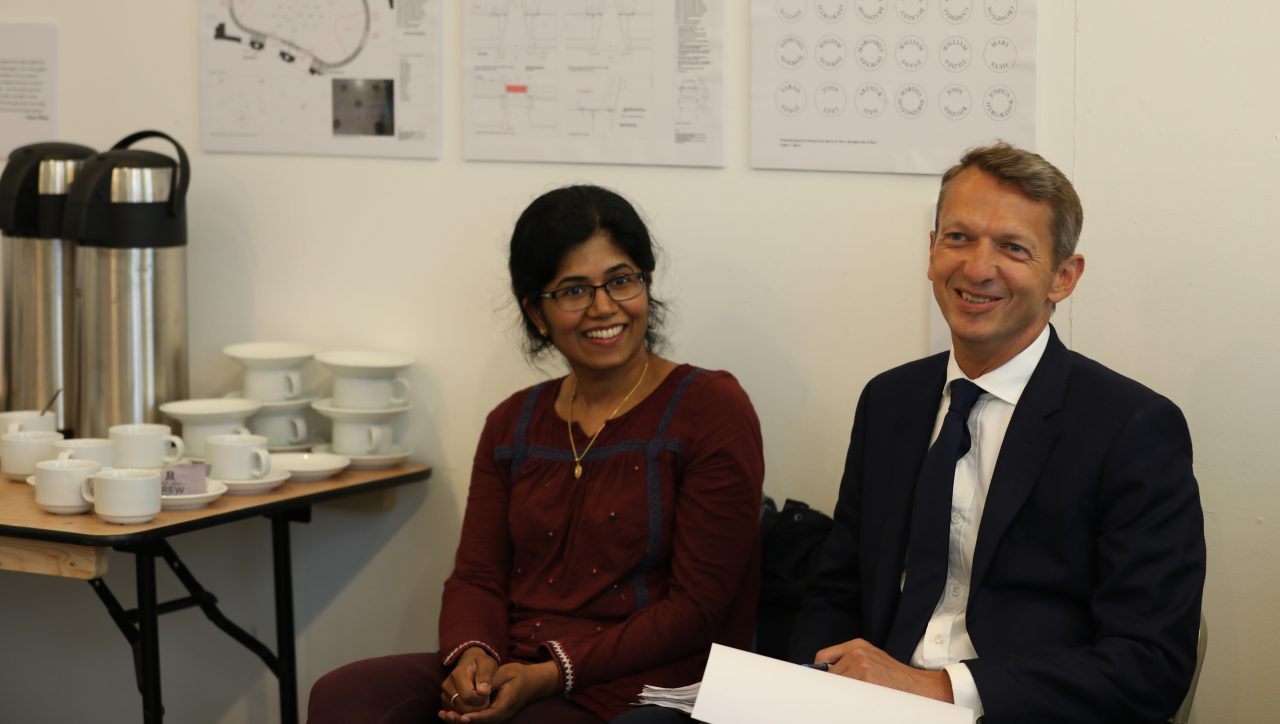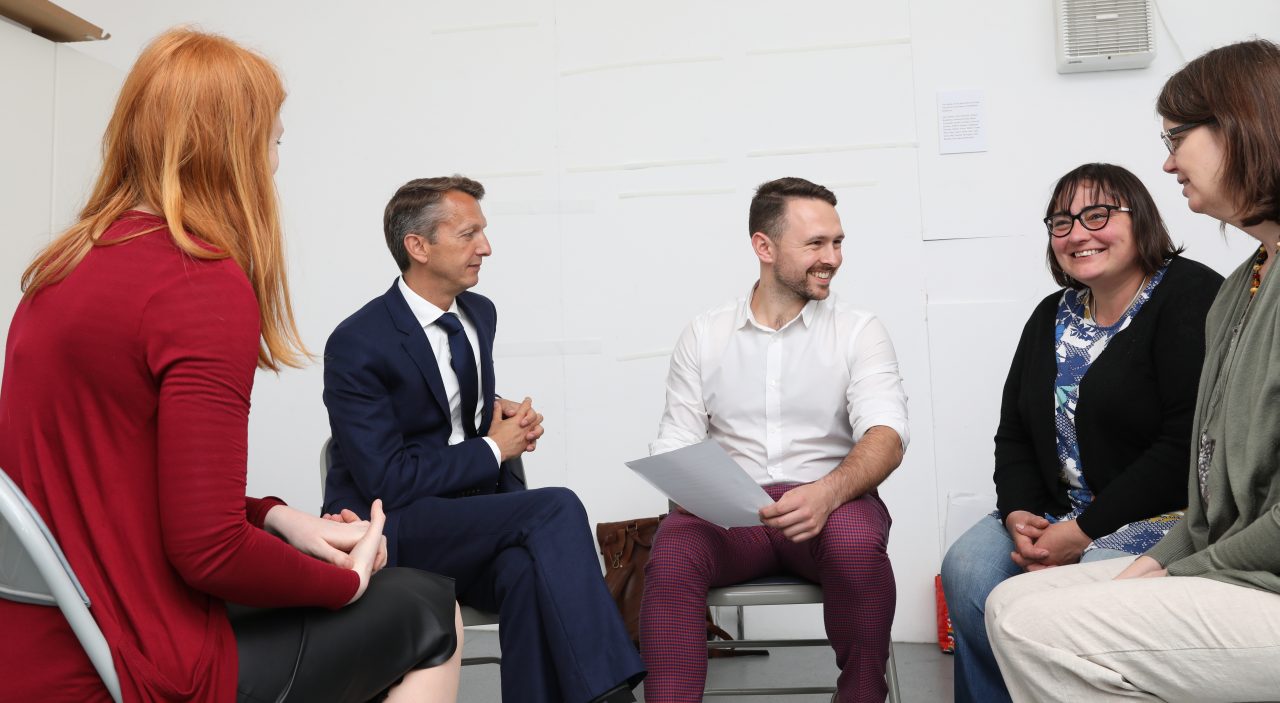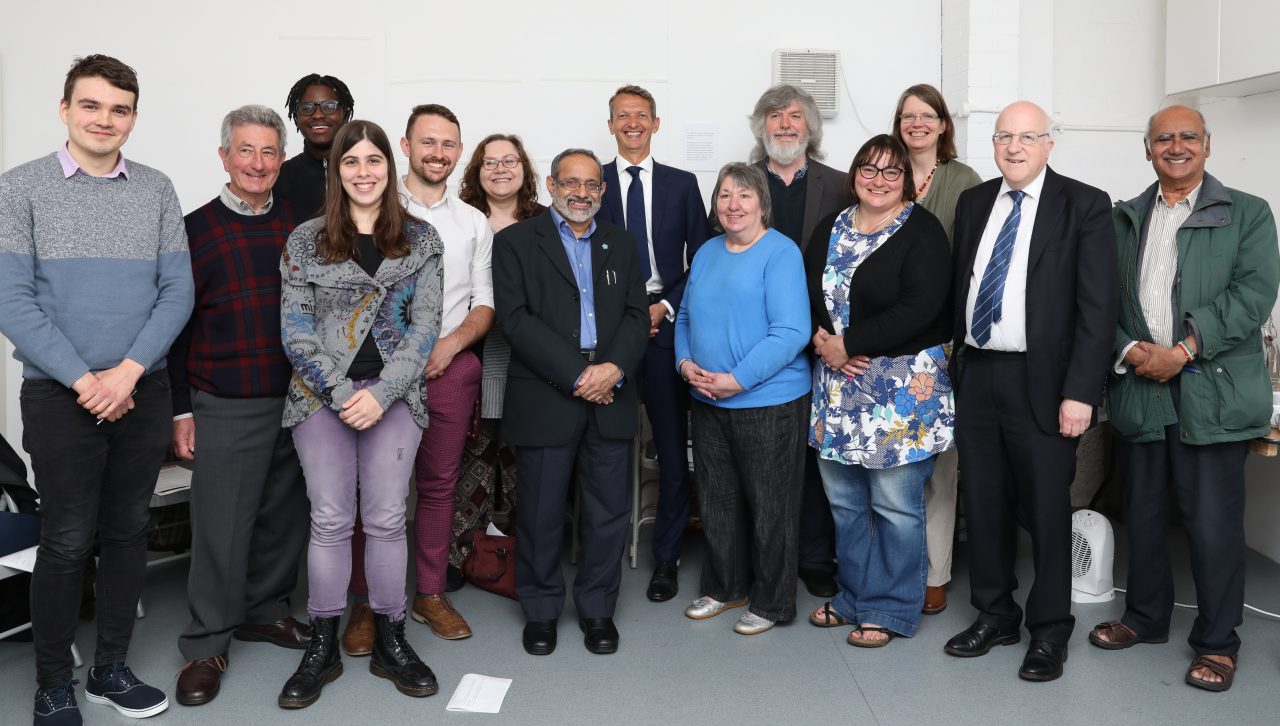
Here’s what happened when a bunch of Mancunians had tea with the Bank of England’s Chief Economist
As Chief Economist of the Bank of England, Andy Haldane is used to answering difficult questions. Over lunch with the Economy team and some of our Manchester crash course participants, he fields queries about everything from interest rates to environmental policy with ease. But eventually we ask something which seems to genuinely flummox him.
“It’s without question the finest question I’ve ever come across,” he tells us, “and one that completely stumped me, to be honest.”
So what is it we’d like to know from the man who is one of the key architects of our country’s monetary policy (which affects how much you pay for everything from your mortgage to your weekly supermarket shop) and has been named one of the most influential people in the world by Times Magazine?
This: would he rather fight one horse-sized duck or one hundred duck-sized horses?
Silly? Undoubtedly. But there is a reason for it. When Economy asks Brits how economics can be talked about in a more engaging and trustworthy way, they tell us that it should be clear, relevant, transparent, positive, available... and human. And what’s more human than getting one of the Bank of England’s top employees into Manchester’s Arts and Design Centre to chow down on ham and cheese sandwiches and tell us all how he’d rate his chances in a hand-to-hand combat against fantastical creatures?
Besides, Andy has a great answer for us.
“When I was thirteen or fourteen years old, I promised myself I would always go after the big issues, even when they’re difficult. So I think faced with that choice, I’d pick the horse-sized duck, because we should never be fearful of taking on the big issues. And who knows, we sometimes even win on them.”

Metaphorical ducks certainly aren’t in short supply here in Greater Manchester. When we start our lunch by asking our twenty-odd attendees to name what worries them about the economy, the answers come pouring out.
Kicking things off is Pat, who is concerned about how bank branches are disappearing from his local high street in Levenshulme. His neighbour, David, would like businesses to act in a more socially responsible way. Across the room, a woman named Mary pipes up to say that political power is too concentrated in London, meaning places like Manchester get overlooked. Another attendee, Cameron, talks about climate change, to nods of agreement throughout the room. Poverty, austerity, prices and transport are also mentioned multiple times.
Listening to concerns like this, Andy tells us later, is key for the Bank of England. “Those conversations will help us to understand what the big issues, drivers and problems are that people face... that's a form of intelligence we couldn't get from any other source.”
It also marks something of a change for the Bank, who traditionally has been more concerned with analysing data sets than sending top-level officials to have face time with local people. So why the shift now? Could it be what Andy termed the “extraordinary 10 year period” the UK has just gone through with the 2008 financial crash, austerity and Brexit?
“Since the crash, we realised we need to engage more broadly.” Andy says. “Central banks have something of a deficit of trust and a deficit of understanding when it comes to the general public. The way we close these deficits is by engaging even more actively, by being even more transparent, by holding ourselves to account to an even wider set of the population than we have in the past.”
Andy doesn’t credit himself with influencing the Bank’s newfound openness. But it’s not hard to see the Chief Economist’s fingerprints all over the strategy. In many ways, Andy Haldane is cut from a slightly different cloth than most central bank workers. His fondness for getting out of the Bank’s gilded headquarters in London’s square mile to hunker down for a chinwag with people all over the country is part of the reason that the economics magazine The Economist dubbed him a “maverick” in a recent profile.
Andy was also an early supporter of more pluralist, accessible economics at a time when, to use his words, it “wasn’t massively popular amongst the economic community.” Not that being outside establishment norms has ever stopped him - in his time at the Bank, he has also made headlines for expressing support for movements like the Occupy protests against inequality. “Never underestimate the power of lending your voice to something” he tells us with a shrug.
We ask Andy if he sees himself as very different from most economists. He grins. “Sometimes I don’t even think of myself as an economist. My job is to understand the economy. And that’s not just not about economics, it’s about conversations. It’s about numbers of course, but it’s about words too. The conversations are what count, the stories are what count.”

Like us, Andy thinks that more of us talking about our economy isn’t just a nice thing to do on a Tuesday afternoon. It can also make real, tangible changes to what our society looks like - both on a personal and a national scale.
“It needs to be a two-way conversation, and I hope it’s a two-way learning process as well,” He tells the room. “So both the Bank of England and the British people will emerge having learnt something about how the economy works and how policy is working. That ought to make for better decisions by people like you - whether its spending or saving or working - and better decisions by people like me - when it comes to setting interest rates or thinking about Bank of England policy.”
Better decisions, of course, is a loaded term. Every action the Bank of England has taken in the last few years - such as lowering the national interest rate to near-zero, or putting new money into circulation through a process called quantitative easing (QE) - has consequences that affect different people differently.
The point of both QE and low-interest rates is to make it cheaper for businesses and people to borrow money. Andy thinks it’s been beneficial - he describes recent policy as having “a very material impact on supporting jobs in the economy”. That’s because borrowed money can be invested in something that will have a big payoff. So a business that finds it cheap to take a loan out might build a new factory, hire lots of people to work in it and churn out a product that benefits the people who buy it in some way, perhaps by making them happier or healthier. Or a person who can easily borrow money might buy a house that gives their family a home whose availability isn’t dependent on the whims of a landlord and could also become a money-making asset for their future (if house prices were to rise).
But there are losers from QE and low-interest rate policy too, and during lunch, some of the participants grill Andy on why they haven’t personally felt the effect of all this extra money. There are other concerns too - if lots of companies and people take on lots of debt which they then struggle to pay back, the UK will have another credit crunch. And because savers don’t get rewarded with interest top-ups people and businesses are less inclined to stash away cash for a rainy day.
Andy listens sympathetically. “People talk to me about the cost of QE and I take these concerns very seriously,” he says. But he also insists that without the actions of the Bank, life in Britain after the financial crisis could have been much worse. “I’ve gone through this, household by household, and I’ve convinced myself - at least myself - that in the absence of QE, there’d be a half a million more people in this country out of work. And I couldn’t let that rest on my conscience.”
It’s true that unemployment in this country is currently just 3.8 percent, which is its lowest level since 1974 (that only counts people actively looking for work, so not people who are, say, students or homemakers). It’s also a subject that is clearly close to Andy’s heart. He recounts how the mass unemployment of the early ‘80s - “three million people unemployed in this country” - was “the biggest issue when I was young” and what “drew him into” economics in the first place.
A lot of that unemployment, incidentally, was concentrated in manufacturing hubs in the North of England (Andy grew up in Sunderland) and was partly blamed on central bank policies, including high-ish interest rates. (The Bank of England’s interest rate in 1989 was 15 percent, compared to 0.75 percent currently). Job creation, Andy thinks, had been “a bright spot for the UK economy over the last few years” although he worries that some of those jobs “don’t pay as much, and may not be as secure”.

But what about the future? We asked Andy if he thinks the UK could see another recession anytime soon - say if Brexit goes badly. “Recessions historically have been a recurrent feature of our economy,” he admits. But he believes that the UK “learnt our lesson” from the 2008 crisis and that “better regulation can help prevent a steep downturn.” Despite the fact that in the past, long periods of low interest rates have been followed by lots of inflation - where prices of everything go up - Andy’s confident that the Bank still has the ability to stave off the worse: “when push comes to shove, central banks can and have been innovative in the tools they’ve brought to bear to guard off a recession”.
He’s also hopeful that the events of the last decade have made people realise how important it is for people to learn about how money and the economy as a whole works, especially at school. “Financial literacy is almost as important as literacy or numeracy when it comes to making wise personal choices,” he says. “I do think we need to put issues of financial literacy much more front and centre in schools to encourage and nurture that savings habit at as early a stage as possible. That includes when to borrow, where to borrow, and when to save.”
Economy is also a big advocate for including economics in school curriculums, so our final question for Andy is this. If better economic education succeeded in getting more young people interested in an economic career, what one piece of advice would the current Chief Economist of the Bank of England give them?
Well, remember what he said about that horsed-size duck?
“Go after the bigger issues.” He gestures at the whiteboard on which we recorded our lunch participants' current economic concerns. “Although these are mostly examples of the economy not working for people, they are ultimately fixable. And what better career for a young person than trying to fix them?”
He pauses, then continues. “If my experience has taught me anything, it’s don’t underestimate how much you can change the world, just by sticking with it, with passion and quite a lot of hard work. Run after the big issues with a passion and with a belief that you can make a change. Because the truth is, you can. You can.”



